Since I was lazy and did not bother writing up day-by-day dispatches from Fantastic Fest like other, more professional Daily Grindhouse writers, I am only now playing catch up with my festival wrap up. Because this piece ballooned to such a ridiculous length, it will be posted in segments broken up to cover two days at a time. The following is part three.
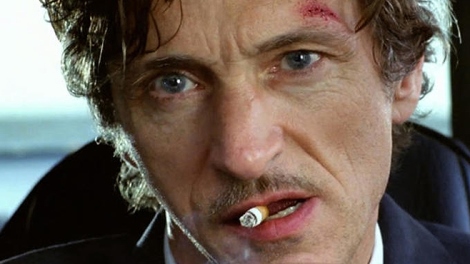
My “day job” requires me to work from 3:30 in the afternoon to midnight. By the time I get home, do a few errands, get a little writing done, and watch the occasional movie, it tends to be a very late bedtime for me. Because of this, it is the rare occasion when I wake up before 10:00 in the morning. But Fantastic Fest does not adhere to my hours, so getting up at the ungodly (for me) time of 8:30 in the morning on day five felt like a Herculean task. You can understand why I might become a tad cranky if the early film on a given day turned out to be a dud—especially if I had not yet had my coffee and breakfast tacos (it’s shocking how quickly you get addicted to those things in Austin).
DAY FIVE

FEBRUARY (2015, United States) is not a dud and it did not quite make me cranky, but it did make me question if it was worth losing ninety minutes of sleep.
Kat (Kiernan Shipka) and Rose (Lucy Boynton) are students at an all girls’ boarding school in upstate New York. When a school break finds all their classmates leaving to spend time with their families, Kat and Rose are left behind. Rose explains away her parents’ absence as the result of a schedule mix up. Kat does not explain anything. She had a dream the night before that her parents were killed in an automobile accident and fully believes that to be the truth. Kat does not tell anyone this belief, but also does not seem upset by the thought.
Allowed to stay in their rooms and looked after by two school caretakers (Heather Tod Mitchell, Rose Gagnon), Kat and Rose get on with the business of ignoring each other.
Kat is three years younger than Rose, but has an eerie poise and always wears a slight smirk, as though she knows something of which no one else around her is aware. Even stranger, Kat seems to spook a priest who visits with her as he accepts that she has some kind of supernatural power. Rose, it turns out, lied to her parents about the timing of the break to spend time with her boyfriend and break the news to him that she might be pregnant.
In a separate storyline, Joan (Emma Roberts), a hitchhiker in her mid 20’s, is picked up by a kindly middle-aged man (James Remar) and his prickly wife (Lauren Holly). The man explains to Joan that they are on their way to lay a wreath at the grave of their daughter on the anniversary of her death. Joan, sullen and distrustful, takes their ride but remains a cold fish as she listens to the man’s tale of loss and how much she reminds him of his daughter. And wouldn’t you know it? Their path is taking them directly toward the school as a winter storm closes in.
Writer/director Oz Perkins sets his characters and their plot threads up carefully. He slowly doles out information to the audience on a need-to-know basis, gets good performances from all of his actors, and milks the gloomy weather and empty school for as much atmosphere he can. But the film still feels routine at best, uninspired at worst.
In many ways, FEBRUARY feels like it could play as a companion piece to THE DEVIL’S CANDY. Both films try to play with the idea of a present evil that may be satanic in nature and both try to retain a slow-burn approach for most of the running time. But where THE DEVIL’S CANDY had the guts to throw caution to the wind with an over-the-top finale, FEBRUARY simply plods along, content with its minor ambitions.
Most of the issues with the film come from inevitability of how the story plays out. From the second that Kat starts behaving even spookier than she was at the beginning of the film, it is clear that she should be watched carefully. Yet the characters pay her little to no mind. Even after Rose sees her bowing down in the basement, seemingly worshipping the furnace, she never thinks that maybe she should put some distance between herself and the weird girl who smirked at her after she finally tried to be sociable and told her she “had her chance.”
When Perkins’ carefully constructed plot revealed a key piece of information halfway through the film, I knew exactly where the story was going and how events would play out. While I do not think that a film has to always surprise the audience, a little effort to find a novel way to get to the expected beats would be nice. Instead, Perkins guides the film along to its inevitable conclusion with very little storytelling ambition. Only a late in the film wrinkle provides a slight willingness to go somewhere new. But that moment is only one in the midst of several very familiar scenes and plot mechanics.
After the gloomy look and tone of FEBRUARY, it was nice to escape into the welcome, silly embrace of another retro Turkish film.
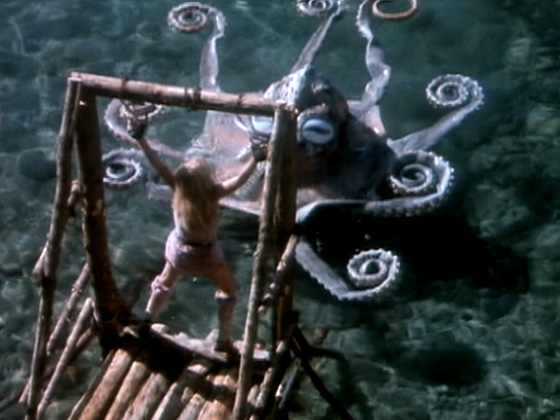
TARKAN VS THE VIKINGS (1971, Turkey), like THE DEATHLESS DEVIL is a movie that defies reviewing. It is loads of fun as the titular hero (Kartal Tibet) takes on hordes of Vikings. Despite the obviously miniscule budget, the film features dozens of battles—some more competently staged than others—hundreds of extras, and a giant octopus that is far more convincing if you squint while looking at it. But the film’s secret weapon is the dog portraying Tarkan’s faithful canine (hilariously named Kurt). This dog goes uncredited, but gives the best performance in the film, hitting its marks, doing stunts, and generally stealing every scene in which it appears without even panting.
While TARKAN was a nice palette-cleanser, it turns out I was just preparing for the next film to leave a sour taste in my mouth.
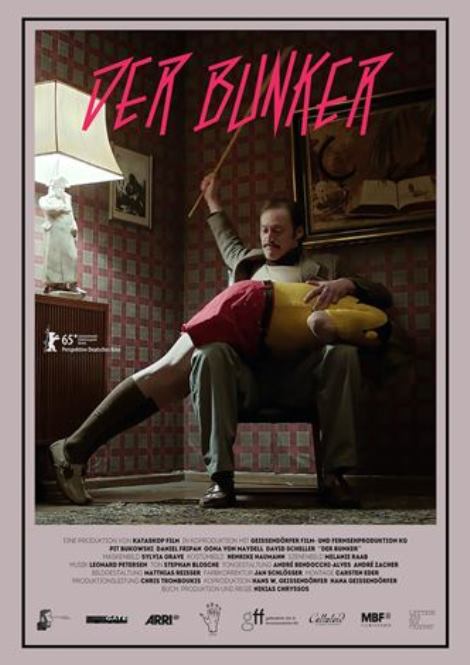
DER BUNKER (2015, Germany) has a promising premise, an off-kilter tone, and stars one of the best young actors working in Germany today in Pit Bukowski. But the actual execution of the film leaves much to be desired.
A grad student (Bukowski), seeking a quiet, secluded place to finish his dissertation, rents a room from a strange couple (Oona Von Maydell, David Scheller). But in the first of several surreal touches by writer/director Nikias Chryssos, the couple’s home is an underground bunker with an interior made up to look like a suburban home from the ‘50s. There is also the issue that the couple behaves as though they have not interacted with anyone from outside their home in several years. Oh, and they have a son named Klaus (Daniel Fripan), who is supposed to be a nine-year-old, but is clearly a grown man. The student clearly finds all of this odd, but the rent is cheap and he just wants to be left alone to work.
Stuck in his windowless room, the student finds work almost impossible to accomplish. If he is not being interrupted by father (one of the more annoying “quirks” of the film is that only Klaus has a name—the others are simply “the student,” “mother,” and “father”), he is stymied by the oppressive solitude of his dingy dwelling.
Before long, the student has been coerced into tutoring Klaus when father is unable to successfully homeschool his son. Mother and father have high hopes for Klaus, grooming him—in their deluded minds—to be President of the United States, despite the fact that they are German citizens. For his part, Klaus wants to please his parents, mostly because he does not enjoy being caned when he fails in his studies.
All of this happens within the film’s first twenty minutes and Chryssos keeps piling on one absurd plot point after another. But none of the absurdity adds up to anything beyond weirdness for its own sake.
Perhaps the film’s greatest sin is that it squanders a good cast. Von Maydell and Scheller are believably unhinged, but never are given anything more to play than the weird behavior required to move the plot along. Fripan has a great deadpan expression and strikes some unnerving notes with his childlike way of talking contrasted with his adult face. Given the least showy role, Bukowski is left stranded, playing straight man to a lot of moments intended as comedy that merely land with a confused thud. Considering he is coming off his go-for-broke, feral turn as the titular character in the very good DER SAMURAI, Bukowski really feels wasted in such a constraining role.
Perhaps something was lost in translation between cultures. Maybe the film is actually skewering some aspect of German society that I am not aware of. But I doubt this is the case. Chryssos heaps on too many bizarre moments and twists (mother talks to her grotesque leg wound and it answers, Klaus still breastfeeds at his very advanced age) for the film to feel like anything other than an exercise in unearned, random weirdness.
But if DER BUNKER failed to earn its overly fussy surrealism, at least it tried to be something different, unlike my final film of the evening.
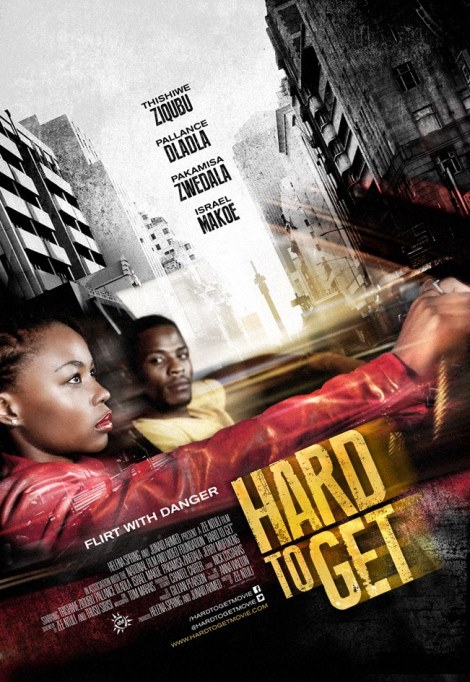
HARD TO GET (2014, South Africa) is probably the most boring film I have seen in the last five years.
TK (Pallance Dladla) is the proverbial big fish in a little pond. Good looking, sweet-natured, and naturally charismatic, he struts around his small South African village, sleeping with every young woman who comes his way. When he sets his sights on Skiets (Thishiwe Ziqubu), a mysterious stranger who appears in the bar where he works, it is much to his surprise and confusion when she shoots him down. Even worse, she takes up with Mugza (Israel Makoe), the local crime boss, who just happens to hate TK.
When Mugza accuses Skiets of stealing his car keys and starts beating her mercilessly, TK jumps to the sort-of rescue, getting pummeled in her place. Of course, it turns out that Skiets actually did steal the keys and she makes her escape with TK riding shotgun and wondering just how far in over his head he has landed.
Skiets drives them straight to Johannesburg where she and TK immediately wreck Mugza’s car and fall in with Gumede (Paka Zwedala), a charming and powerful criminal kingpin. While TK falls in love with the ever-enigmatic Skiets, they embark on an inept crime spree that threatens to turn serious—and deadly—at any moment.
There is nothing especially wrong with HARD TO GET. It’s slickly shot, the cast is appealing, the editing could be tighter, and the tonal shifts handled more gracefully, but the overall package of the film is fairly pleasing on the surface. But it is also a story that has been told countless times by directors as dynamic as Martin Scorsese, Quentin Tarantino, and Tony Scott, just to name a few. Unfortunately, Zee Ntuli directs the film like he consulted scenes from GOODFELLAS, PULP FICTION, and TRUE ROMANCE before shooting every second of his film. The result is one scene after another of unnecessary slow-motion, jump cuts, and comedy contrasted with sudden violence. There is nothing in HARD TO GET that has not been done a thousand times before by filmmakers who often used the same type of in-your-face style to better effect.
I suppose that is why I found the film so dispiriting. Despite the potentially interesting twists that could have been mined from the relatively under-seen South African locations and culture, Ntuli strives to make the film resemble American big-budget films as much as possible. Instead of his film turning out like another Scorsese or Tarantino-inspired homage, it comes off like a rip off of a rip off, resembling an even more anemic version of something like TWO DAYS IN THE VALLEY.
If HARD TO GET had simply been derivative, I think I could have handled it better than I did. At least there would still have been the potential for a fun pastiche. Instead, even with Ntuli’s overly busy direction, it is the worst thing a film can be: boring.
DAY SIX
It had to happen sooner or later. After the disappointment of HARD TO GET, I had to run into a film so mind-bogglingly bad that I could not sit through it. That is exactly what happened with my first scheduled film of the day. Sine I did not watch the entire film, I do not think it is fair to name it. But if it had been ineptly made or had some sort of so-bad-it’s-good quality to it, I would have stuck it out. But it was the worst kind of bad: a morose, self-serious melodrama. Life is too short to stick out such things, so I quietly made my exit and grabbed an early lunch.
This made TOO LATE (2015, United States) my first completed film of the day. I only knew three things about the film: one, it starred John Hawkes—a fact that will usually garner a large amount of goodwill from me; two, it was shot on 35mm film and was being projected from a 35mm print; three, it was described as a Raymond Chandler-esque L.A. detective story. I am both glad and frustrated I did not know more about the film going into it.
Honestly, I was worried from the word go since the film starts out very, very awkwardly.
Dorothy (Crystal Reed), young—maybe 25-years-old at the most—and pretty, wanders through a Los Angeles park, looking anxious and exhausted. Matthew (Rider Strong) and Jesse (Dash Mihok), a couple of dim-witted drug dealers shoot the breeze with a conversation as they approach her. While Matthew is lascivious and Jesse is dumb, neither one means any harm to Dorothy. They even let her use their cell phone to call a friend.
Dorothy’s friend turns out to be Sampson (Hawkes). Their conversation lasts only a few seconds as Dorothy starts to remind him she is, but he tells her he remembers her and he will be there to pick her up in ten minutes. Dorothy thanks Jesse and Matthew for their kindness, they give her some complimentary ecstasy and they part ways.
While waiting for Sampson, Dorothy meets Fontaine (Brett Jacobsen), a slimy guy who claims to be a park ranger. Fontaine chats up Dorothy and she seems to enjoy his company as they talk about going to movies, their favorite snacks, and other idle chitchat. Dorothy gradually lets on that she is scared because she worked at a strip club and might have across some shady information about the club’s owners that would put her life in danger. Fontaine sympathizes, explains his mother was a stripper, and then chokes the life out of poor Dorothy with his bare hands.
After Fontaine flees the scene, Matthew and Jesse find Dorothy’s body. Mistakenly believing she overdosed on their drugs, they panic when they realize she used their cell phone. When Sampson comes driving up, they run away in fear, but he does not give the men a second glance once he finds Dorothy.
This setup is much longer than it needs to be. The main reason that the sequence takes twenty minutes is that writer/director Dennis Hauck shoots the entire film in five uninterrupted takes consisting of twenty minutes each. It is a hell of an audacious trick to try and pull off, but impressively enough, his cast, cinematographer Bill Fernandez, and a team of Steadicam operators all pull together to make it happen—while shooting on 35mm film, no less. But does it make the film better?
Hauck further pushes the film into a semi-experimental direction by structuring it as a piece of non-linear storytelling. The second segment features Sampson confronting the man who paid Fontaine to kill Dorothy. The rest of the film bounces around back and forth in time to before the murder and after it, eventually adding up to a character piece that sketches out how broken and lonely Sampson is under his cool demeanor.
And as though the film did not need one more abstract idea to set it apart, the dialogue is a straight-faced send up of pulp detective novels from the ‘30s. Instead of the Raymond Chandler homage that I assumed the film would be, Hauck has a ton of fun playing with the dissonance of actors spitting out flowery, hard-boiled lines that would be more at home in an episode of Police Squad while playing the emotions straight.
Frankly, I did not know how to take TOO LATE when I left the theater. It struck me as an interesting experiment, but I had trouble justifying the numerous layers of artifice that Hauck concocted. But after a day and a night where I had trouble getting it out of my head, I realized there was more to it than the showy style. The emotions were true and the sadness in Hawkes’ performance is real. Sampson is a man with some hard regrets and all of those regrets come back to bite him in the ass in a big way when he finds Dorothy’s body. I came to see the film as the tragedy that it is and Hauck’s structure presents that tragedy in such a way that it doesn’t feel maudlin or too ironic. It really is a clever sleight-of-hand technique on his part.
But the trouble with the single take approach becomes apparent in some of the performances. The first section is the roughest as it takes the audience a while to accept the dialogue being spewed is supposed to both be funny and slowly providing clues to the story that is about to unfold. But the actors are charged with hitting so many different marks at the same time that they are trying to make the stylized dialogue sound natural, their performances come across very, very stilted. It is telling that this is the segment which features Hawkes’ briefest appearance.
It is not surprising that Hawkes is so good in the film. He is able to casually shift gears from amused to horrified to earnest without breaking a sweat and his weathered face and slight build help sell the twisty dialogue. He simply looks like a man who has survived a lot and seen it all, so it makes sense that he should be allowed to talk like a hard-boiled badass and a barstool philosophizer, depending on the situation.
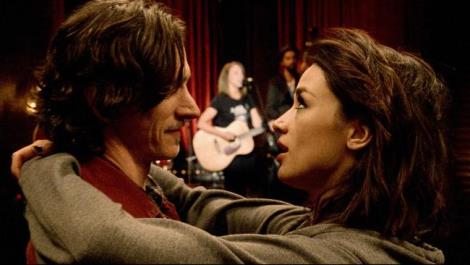
After the rough first segment, Hauck backs up Hawkes with a stellar supporting cast that are able to handle dialogue and look like they are having the time of their lives. Robert Forster, Joanna Cassidy, Natalie Zea, Jeff Fahey, Dichen Lachman, and Sydney Tamiia Poitier all look and act like they were born into this world. It had to have been a tough assignment, but they all pull off their roles with panache.
Had I known a little more of what to expect going into TOO LATE, I may have been able to settle in and get on its wavelength a little easier. Now that I understand the tone of the film, I look forward to seeing it a second time. I have the feeling it would knock my socks off.
On a special note, TOO LATE was the only film shown from a 35mm print that I saw at Fantastic Fest. After several days of (very high quality) digital projection, the warm colors and tones of an actual celluloid print was breathtaking. I highly recommend people seek this film out when it is released. It serves as a great reminder of why a handful of filmmakers and distributors are trying to save film as a shooting and projection option.
My second and final film of the day was another film that defied expectations.
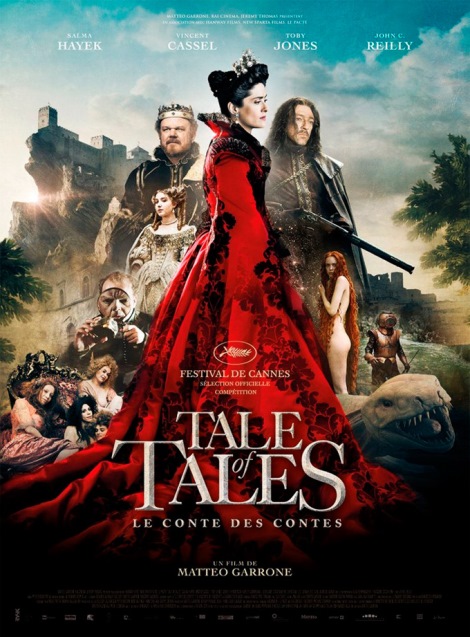
TALE OF TALES (2015, Italy/France/UK) is the first English-language film of co-writer/director Matteo Garrone. Best known to me (and most international audiences) as the filmmaker behind the bleak mafia drama GOMORRAH from a few years back, it was a real surprise to find him crafting this pure fantasy. Of course, the film is far from a traditional fairy tale.
An opening prologue tells the story of the King and Queen of Longtrellis (John C. Reilly, Salma Hayek). Unable to conceive a child, the Queen is practically inconsolable. A stranger (Franco Pistoni) appears at their castle and gives them fantastical instructions on how she may bear a child. Namely, she must consume the heart of an albino sea serpent. Of course, in the best fairy tale practice, the heart must be cooked by a virgin. The stranger promises that the Queen will immediately conceive and give birth to a child. But he also warns that the price of using this bit of magic is possible death.
Skeptical, but eager to please his Queen, the King dons a deep-sea diving suit, wades into the ocean and kills one of the sea serpents. As the Stranger warned, the King is mortally wounded in the battle with the serpent. The heart is prepared as instructed, the Queen devours it, and gives birth to a baby boy within a day. What no one anticipated was that the virgin Kitchen Worker (Laura Pizzirani) would also conceive and give birth to a baby boy.
At the funeral for the King, in addition to the characters already introduced, two other Monarchs attend to pay their respects. The King of Strongcliff (Vincent Cassel) and the King of Highhills (Toby Jones) are about as different as you can get. Strongcliff is handsome and over-sexed while Highhills is diminutive and dotes on his newborn daughter.
The film then jumps ahead roughly sixteen years. Elias (Christian Lees), the son of the Queen, is a pale, white-haired young man who is the spitting image of Jonah (Jonah Lees), the son of the Kitchen Worker. Both boys feel a strong bond to the other and have grown up playing together. This fact eats at the Queen. She tells Elias that he is a Prince and cannot be seen keeping company with a commoner. When the Queen takes out her frustrations on Jonah’s mother, he decides to leave the kingdom, much to Elias’ distress.
Meanwhile, the King of Strongcliff, bored with the countless beautiful women he has at his beck and call, becomes obsessed with a woman he hears singing in her home far beneath his castle window. But he does not realize the woman is Dora (Hayley Carmichael), an old maid who lives with her sister Imma (Shirley Henderson). Despite being well into old age, the women have retained the timid voices of teenagers. Since the King never got a good look at Dora, he begins wooing her with jewelry and over-the-top adulations. Hoping to milk the King for as much as she can, Dora tries to keep up the ruse. She ropes Imma into her scheme and the two women go to extremes to give the King just enough to keep him intrigued, but they can only hold him at bay for so long.
The King of Highhills has aged into a lonely middle-aged man. His daughter Violet (Bebe Cave) is anxious to see the world and find a husband. This thought causes him great anxiety. Of even more pressing concern to the King is the pet flea he is raising by feeding it his own blood. As the flea grows larger, it becomes more difficult for him to keep it a secret. These two concerns collide in a hilarious and horrifying way.
While the film is beautifully shot with opulent costumes, sets, and locations, the ensemble never really gels into a cohesive vision. The casting feels like a compromise between several producers intent on getting the biggest name for their money, even if they do not fit the role they are playing. To be fair, no one in the film is bad, they just feel miscast at times. The major exception to this rule is Cassel. He dives into his broadly comedic role with gusto, injecting some electricity into Garrone’s occasionally slack pacing.

It is to the credit of Garrone and his co-writers that none of the stories go anywhere near the routes that I expected of them. The story of Elias and Jonah comes the closest to playing out in a straightforward manner, but even this segment eventually finds a way to twist its journey with an ending that plays to some unexpected action beats and a melancholy grace note. But the other two stories take such abrupt left turns into bloody horror movie territory that they left me thrilled to see how the stories would eventually tie back together.
And that is where TALE OF TALES is somewhat disappointing. The three stories eventually intersect in only the most superfluous of ways before the film abruptly ends. This leaves the whole film feeling anticlimactic and unstructured in a way that feels sloppy, even with all the entertaining threads that lead to that point.
In the next—and final—part of my epically late wrap up, one of the most adorable films I’ve ever seen that involves several people dying, a surprisingly funny and touching comedy starring Mads Mikkelsen, recycled porn footage, the touching story of a man and his turtle, and Kurt Russell vs. cannibals in the Old West.
Tags: Dash Mihok, Dichen Lachman, Dogs, Emma Roberts, Film Reviews, France, Germany, Heather Tod Mitchell, Horror, Italy, James Remar, Jeff Fahey, Joanna Cassidy, John C. Reilly, John Hawkes, Kartal Tibet, Kiernan Shipka, Lauren Holly, Lucy Boynton, Matt Wedge, Matteo Garrone, Natalie Zea, Pit Bukowski, robert forster, Rose Gagnon, Salma Hayek, South Africa, Sydney Tamiia Poitier, The UK, Toby Jones, Turkey, Vincent Cassel


No Comments